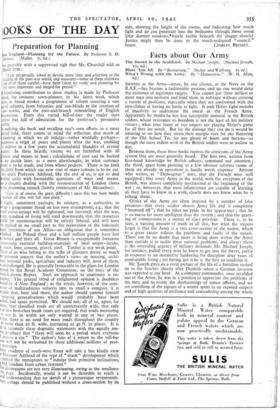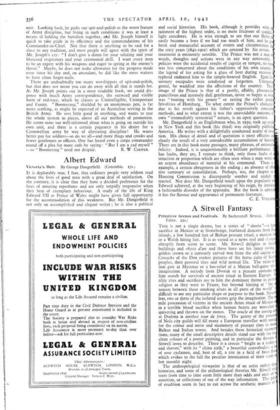Facts about Our Army
SNIPING at the Army—never, by any chance, at the Navy or the R.A.F.—has become a fashionable pastime, and no one would deny the existence of legitimate targets. You cannot put three million or more men into uniform and bind them in red-tape without creating a variety of problems, especially when they are confronted with the anti-climax of having no battle to fight. It took Hitler eight months of inactivity to undermine the moral of the French Army. Apparently he thinks he has less susceptible material in the British soldier, whose resistance to boredom is not the least of his military virtues ; what time many of our snipers are playing Hitler's game for all they are worth. But for the damage they can do it would be amusing to see how they strain their myopic eyes for any fluttering of the Old School Tie, for any gleam of boots and buttons—as though the most ardent wish of the British soldier were to wallow in dirt.
Between them, these three books express the criticisms of the Army system that are most generally heard. The first two, written from first-hand knowledge by British officers, command our attention ; the third, apart from pointing to a few obvious reforms (some of them are already in operation) is hardly worth sixpence. Anyone who writes, as " Demogitus " does, that the French were well equipped ; that every Army in the world, with the exception of the British, was almost completely mechanised at the beginning of the war ; or, moreover, that most infantrymen are capable of learning all they have to know in a week, clearly does not know what he is talking about.
Critics of the Army are often inspired by a number of false premises—that every soldier detests Army life and is completely "browned off "; that he takes no pride in his appearance ; that he is en masse far more intelligent than the system ; and that the grant- ing of commissions is a matter of class privilege. There is, to be sure, a varying amount of truth in all this, but what the snipers forget is that the Army is a vast cross-section of the nation, which to a great extent reflects the problems and faults of the nation. There can be no doubt that more is being done within the Army than outside it to tackle these national problems, and always there is the overriding urgency of military demands. Mr. Michael Joseph, for instance, pulled every wire he knew to get into the forces, partly in response to an instinctive hankering for discipline after years of comfortable living ; yet having got it he is the first to condemn it.
Mr. Joseph gives us a vivid picture of the life of a battalion rushed on to the beaches shortly after Dunkirk when a German invasion was expected at any hour. As a company commander, since invalided out of the Army, he was in a position to appreciate the problems of the men and to resent the shortcomings of senior officers, and we see something of the rigours of a winter spent in an exposed outpost and of high qualities of resilience and comradeship among the whole
unit. Looking back, he picks out spit-and-polish as the worst feature of Army discipline, but living in such conditions it was at least a means of holding the battalion together, atid Mr. Joseph himself is quick to takc pride in its efficiency and the commendations of his Commander-in-Chief. Not that there is anything to be said for a slave to any tradition, and most people will agree with the spirit of Mr. Joseph's cry : "I don't give a damn for your saluting and your blancoed respirators and your ceremonial drill. I want every man to be an expert with his weapons and eager to spring at the enemy's throat." Maybe, he does not make allowance for the ptogress made even since his day and, en attendant, he did like the mess waiters to have clean finger-nails.
There are undoubtedly too many worshippers of spit-and-polish, but that does not mean you can do away with all that it stands for. As Mr. Joseph points out in a most readable book, we could dis- pense with much Army correspondence, the outward and visible form of red-tape, which he classes as Unintelligible, Unimportant and Funny. "Boomerang," shielded by an anonymous pen, is far more scathing, as might be expected of an Australian serving in the British Army. He sees little good in anything, and wants to tear the whole system to pieces, above all our methods of promotion. He seems none too well-informed about what is going on outside his own unit, and there is a certain piquancy in his desire for a Cromwellian army by way of alleviating discipline! He wants better pay for soldiers—so do we all—and more thugs and crooks and fewer gentlemen as officers. One has heard even a corps commander round off a plea for more cads by saying : "But I am a cad myself" —so " Boomerang " need not despair. R. W COOPER.



























 Previous page
Previous page